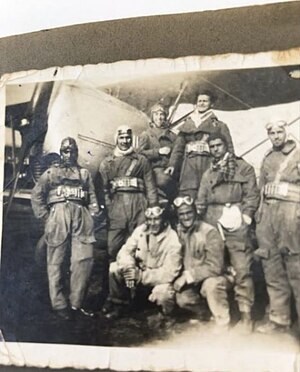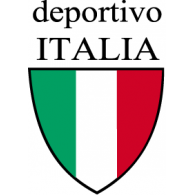Pompeo D'Ambrosio

Pompeo D'Ambrosio was born in San Marco Evangelista (near Napoli) in January first 1917 and died in Caracas in April 15, 1998. He was a pilot of the Italian air Force, a lieutenant of the Italian Army during WW2, a vice president of a bank in Venezuela and a manager-owner of a soccer team in Venezuela (the "Deportivo Italia").[1]
Life[change | change source]
Pompeo D'Ambrosio was born near Salerno in 1917 and studied "Colonial Administration" at the University of Napoli.

He was a pilot of the Italian Ai Force in the late 1930s and later (after discharged from being a pilot because of an accident) a lieutenant of the Italian Army ("Divisione Brescia") during WW2.
He was also under orders of Rommel in the Tobruk battle and received a medal of honor in the second battle of El Alamein in november 1942, where he was commanding an anti-tank unit.
He was wounded in that battle and made POW for 3 years in an Egypt concentration camp.
In 1943 he was promoted to lieutenant-colonel and received a military Medal of Honor by Italian authorities (even if he was a POW).
When he returned to Italy in 1946 he co-founded in Salerno the local section of the MSI, a right-wing political party that later changed name in "Alleanza Nazionale" and now (2022) is ruling Italy as "Fratelli d'Italia".
Pompeo D'Ambrosio after the end of WW2 used to tell that he was lucky when he was discharged from the Air Force, after a dive exercise with his fighting airplane in early 1940 that left his ears bleeding (and so no more apt for pilot): he used to say that he would have died in aerial combat during WW2, like happened to all the other seven pilots of his air force group. The reason: the Italian airplanes were no match for the powerful airplanes ("Spitfires", etc..) of the English and -as he used to say- it was needed "suicidal courage" and not "normal courage" to engage in flight battles against the Allies with the "flying coffins", as were nicknamed the old Italian airplanes
He moved to Venezuela with his family (he had a son and a daughter, who can be seen in the above photo) in the early 1950s.
He was well known in the Italian community in Caracas and was very active - with his financial activity as vice-president at one of Venezuela's leading banks ("Banco Latino") - in promoting the many successes of Italian entrepreneurs in Venezuela.

He was even a financial manager for "Deportivo Italia", the Italian community football club in Venezuela, during the "golden" years (in the sixties and seventies). Those years, when he ruled the team with his brother Mino, are remembered as the D'Ambrosio Era.
The Deportivo Italia was awarded as the best football team of Venezuela in the XX century, by the FIFA's "International Federation of Football History and Statistics".
Influence on the Italian community in Venezuela[change | change source]
In 1951 Pompeo D'Ambrosio moved to Venezuela, where he began working as director of the "French and Italian Bank" (later called "Banco Latino"), funding the Italian community of Caracas, Maracaibo and Puerto La Cross.
Many Italian-Venezuelan companies, such as "Vinccler" and "Constructora Delpre" (who made the skyscrapers of the "Complexo Parque Central", until 2011 the tallest in South America), received experienced advice and financial help to grow to the highest levels in the Venezuelan economy.
The historian Santander Laya-Garrido cites him, in his book "Los Italianos forjadores de la nacionalidad y del desarrollo económico en Venezuela" (The Italians creators of the nationality and the economic development of Venezuela), as an example of honesty and dedication to the community.[2]
He became vice-president of the biggest private bank in Venezuela, the Banco Latino. He tried to go against the corruption of Pedro Tinoco (president of the Banco Latino and of the Banco Central de Venezuela) and his group, but was forced to resign: after his renounce the bank went bankruptcy in the biggest financial crisis of the country, that opened the doors to the (later president) Chavez's take of power in Venezuela.
Related pages[change | change source]
Notes[change | change source]
- ↑ "3 famous Italians of Venezuela (in Italian)". Archived from the original on 2023-10-26. Retrieved 2023-10-26.
- ↑ Santander Laya-Garrido, Alfonso. Los Italianos forjadores de la nacionalidad y del desarrollo económico en Venezuela. pag 85
Bibliography[change | change source]
- Briceño Javier. Un Sueño llamado Deportivo Petare. Universidad Catolica Andres Bello (Publicaciones y Tesis). Caracas, 2013 (Pompeo D'Ambrosio, p.33)
- Santander Laya-Garrido, Alfonso. Los Italianos forjadores de la nacionalidad y del desarrollo economico en Venezuela. Editorial Vadell. Valencia, 1978.
